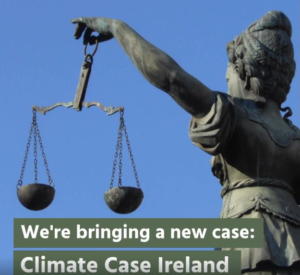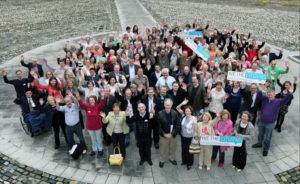Attacking the Irish Government’s abysmal National Mitigation Plan
The Friends of the Irish Environment eNGO raises the stakes in court
The environmental advocacy group, Friends of the Irish Environment (FIE), has filed a legal action against Ireland claiming that the government’s National Mitigation Plan (Plan) fails to provide for a reduction of greenhouse gas (GHG) emissions sufficient to protect the people of Ireland or to meet the government’s obligations under EU law. FIE asks the court to require the government to replace the failed Plan with a more ambitious strategy. This national “Climate Case” was heard before the Irish High Court in January 2019 and awaits a decision by the court.
In the recent proceedings before the Court, legal counsel for the Irish government argued, among other issues, that FIE had no right to bring the case on behalf of all Irish citizens and that the organization was trying to intervene in the national policy process.

There is the technical, legal issue of whether FIE has “standing,” which is the right of people to challenge the conduct of another person, including agencies and governments, in a court. In many, but not all, cases FIE and others have been found to have standing to bring cases for environmental wrongs. At times that right has been grounded on Article 9 section (2) of the Aarhus Convention:
What constitutes a sufficient interest and impairment of a right shall be determined in accordance with the requirements of national law and consistently with the objective of giving the public concerned wide access to justice within the scope of this Convention. To this end, the interest of any non-governmental organization meeting the requirements referred to in article 2, paragraph 5, shall be deemed sufficient for the purpose of subparagraph (a) above. Such organizations shall also be deemed to have rights capable of being impaired for the purpose of subparagraph (b) above.
Then there is the larger, political question of who has the power, resources and commitment to attack in court governmental inaction that puts the people in jeopardy.
The Mitigation Plan is blantly inadequate as it provides little if any concrete action to tackle, or mitigate, the disastrous impacts from climate change and there is no scientific and other serious dispute about the seriousness of those impacts. Recent and ongoing extreme weather events attest to this unfolding disaster.

While the government’s passive behavior may have been tolerated for years, that is no longer the case. Times, they are a changing. Witness a recent editorial in the Irish Times:
The [National Mitigation] plan was heavy on proposals, light on actions. Less than a year later, Minister for Climate Action Denis Naughten has been forced to admit it needs radical overhaul. His inaction, given the immediate verdict of the Government’s own Climate Change Advisory Council and climate scientists, who had warned more needed to be done urgently, amounts to a gross failure to respond to an emerging crisis. (emphasis added)
In the Executive Summary for its latest Annual Report, the Climate Change Advisory Council (CCAC), appointed by the government pursuant to the Climate Action and Low Carbon Development Act (2015), states unequivocally that:
Irish greenhouse gas emissions are rising rather than falling. Ireland is completely off course in terms of achieving its 2020 and 2030 emissions reduction targets. Without urgent action that leads to tangible and substantial reductions in greenhouse gas emissions, Ireland is unlikely to deliver on national, EU and international obligations and will drift further from a pathway that is consistent with transition to a low-carbon economy and society. (emphasis added)
And this past year the Citizens’ Assembly weighed in strongly on the urgency to address climate change. The Citizens’ Assembly is a body comprising the Chairperson and 99 citizens, randomly selected to be broadly representative of the Irish electorate. It was legally established by a Resolution of the Oireachtas (legislature) to consider some of the most important issues facing Ireland’s future. The Resolution included the following among five matters to be considered: “how the State can make Ireland a leader in tackling climate change.”
Following review of 1,185 written submissions on the question, two weekends of open public hearings, and deliberations, the Assembly adopted thirteen recommendations on climate change, reflecting broad endorsement of climate action.

The recommendations represent a clear consensus by a representative body of all citizens and provides the government with a blueprint of specific, concrete actions that the citizens want the government to undertake, including: for the State to retrofit public buildings, and use low carbon vehicles; for the public to pay higher taxes on carbon intensive activities; for the assessment of critical infrastructure (energy, transport, water and communications) to prepare for extreme weather events, with priority spending on the most vulnerable of these; for greater community ownership of future renewable energy projects; for the end of subsidies for peat extraction and use of the savings for peat bog restoration, with some protection for workers affected; for greater priority of public transportation rather than new roads; for mandatory measurement and reporting of food waste; and, perhaps most controversially, for a tax on GHG emissions from agriculture.
When one compares the Assembly Recommendations to the government’s National Mitigation Plan, we can see that the citizens are far ahead of the government. Unfortunately, there is no sign that the government will catch up and act on the Assembly recommendations. Indeed, it immediately rejected out of hand any tax on agriculture emissions.
The community at large, as represented by the Assembly, as well as the panel of experts on the CCAC, and the national press have spoken. The Irish public is demanding that its government take action to effectively protect it from the threats of climate change. Yet it also seems clear that the Irish government refuses to listen, or is incapable of doing so.
So it is time for the courts to listen.
And who shall they listen to? Certainly the national press, the government’s own appointed climate experts and a Citizens’ Assembly are unable to bring the government to court. Someone else had to step in. We can be grateful we have those with the commitment, credibility and expertise of FIE, or An Taisce, or Peter Sweetman to take on the burden of bringing these failures to the attention of the courts.
Let us hope that the current Climate Case provides an opportunity for the courts to offer the Irish public the necessary protections against the impacts from climate change that the Irish government seems incapable of delivering. If the government will not listen to its Citizens’ Assembly or its own body of experts on climate change, then maybe it will listen to the courts.
Recall that lawyers for the Irish government also claimed in this Climate Case that FIE was trying to intervene in the national policy process. Assumedly, the government’s lawyers were raising this as some sort of affront or impertinence on the part of FIE. The reality is that FIE is indeed attempting to influence the national climate policies, or lack thereof, of the Irish government through the lawsuit. That is what concerned citizens can, and sometimes must, do.
Bringing a lawsuit is not always legally successful but nevertheless it can be critical in focusing the attention of the public on the inadequacies of the government in dealing with climate change. By so doing it can help develop public opinion and generate public action, and expose the failings of those who pretend to govern. That can translate into voting behavior and that always gets the attention of the politicians running the government, however temporarily.
Sources:
Isabella Kaminski, “Irish Court to Decide If Country Must Strengthen Its Climate Plan,” Climate Liability News (28 Jan 2019). bit.ly/2Um7fCW
Friends of the Irish Environment et al. v. Fingal County Council et al., Irish High Court bit.ly/2Rs9rah
Climate Change Advisory Council (Ireland), Annual Review 2018 (July 2018). bit.ly/2NL430o
Editorial, “The Irish Times view on Ireland’s response to climate change: incoherent and weak,” The Irish Times (1 Sept 2018). bit.ly/2PAkjT3
The Citizens’ Assembly, Third Report and Recommendations of the Citizens’ Assembly: How the State Can Make Ireland a Leader in Tackling Climate Change (18 April 2018). bit.ly/2HJEoDH
Robert Emmet Hernan, “A Tipping Point on Climate Change in Ireland?” in the Reports section of irish environment (01 Jan 2018). bit.ly/2MHVNSd
Robert Emmet Hernan, “EEB Report on Access to Justice and Litigation in the EU” in the Reports section of the current issue of irish environment (February 2019).


No comments yet, add your own below